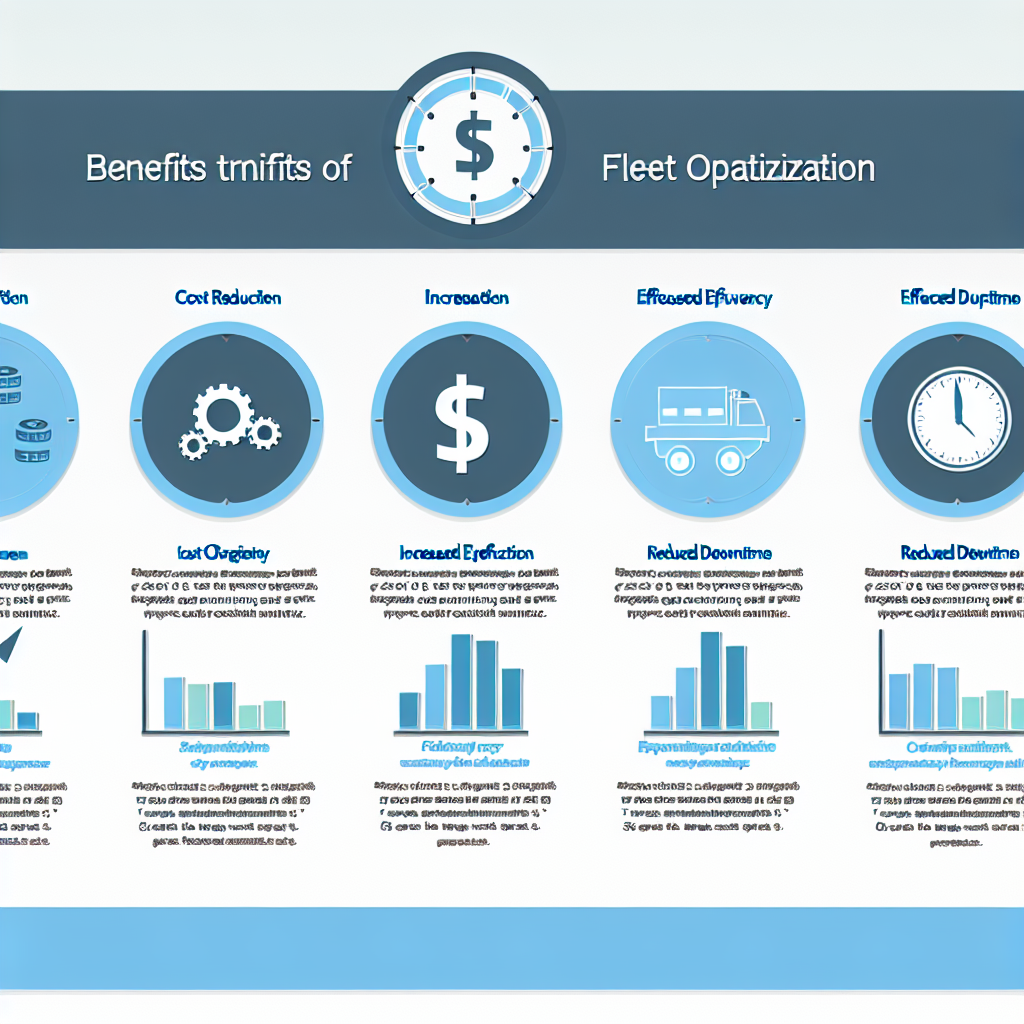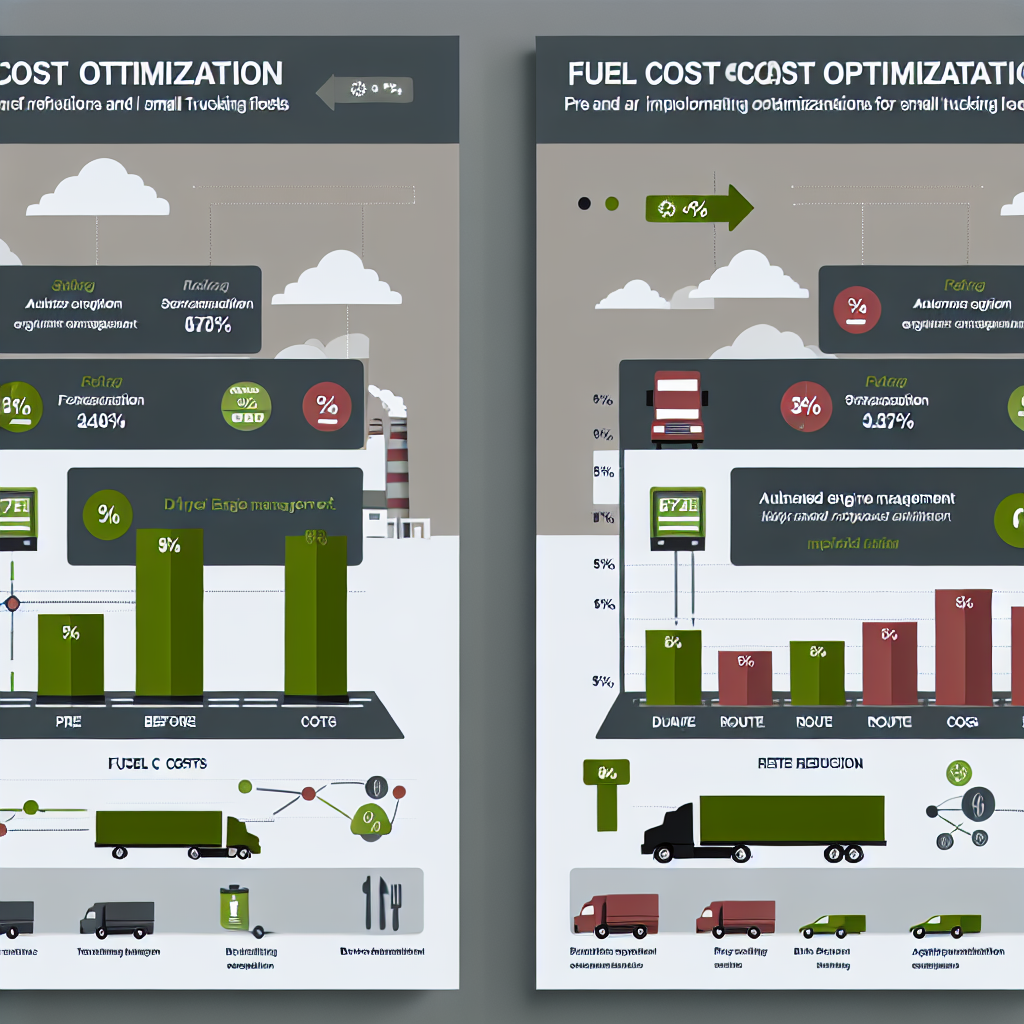Fleet optimization is an essential aspect of operational efficiency for trucking companies, particularly small fleets like Turnage & Sons LLC. This family-owned milk-hauling business operates a fleet of 29 trucks, specializing in transporting organic milk from 33 producers primarily to customers in Mississippi and Louisiana. The effective management of both fleet size and maintenance scheduling plays a crucial role in ensuring smooth operations, especially during peak seasons when the operational radius can stretch to states as distant as Missouri, New York, Virginia, and Tennessee. With the Turnages at the helm, they leverage their generations of trucking experience to optimize their resources, proving that even small fleets can be mighty through strategic planning and execution.
Welcome to the Article
This is an introductory section that provides an overview of the content.
Benefits of Optimizing Fleet Size
Optimizing fleet size is crucial for companies like Turnage & Sons, where operational efficiency directly impacts costs, service quality, and reliability. Here are key advantages of maintaining the right size fleet:
Cost Reduction
A well-optimized fleet can lead to significant cost savings in several areas. For Turnage & Sons, which operates a fleet of 29 trucks, optimizing routes can reduce fuel expenses. It is reported that effective fleet management can lead to fuel savings of approximately 12% by minimizing idle times and improving route efficiency. Additionally, proactive maintenance scheduling can decrease maintenance costs by up to 30%. This is achieved by preventing unexpected breakdowns, thereby extending vehicle lifespan and ensuring that the trucks remain in peak operating condition.
Increased Efficiency
An appropriately sized fleet enhances productivity through better vehicle utilization. By ensuring that each of the 29 trucks is actively engaged, Turnage & Sons can make more deliveries and maximize revenue. Utilizing advanced dispatching technology enables the company to track vehicles in real-time, resulting in improved operational decisions and timely deliveries, which are essential in milk hauling due to the product’s perishable nature.
Effective Resource Allocation
With an optimized fleet, resources are utilized more effectively. Turnage & Sons can monitor vehicle usage to identify any underutilized assets. The data-driven insights derived from fleet analytics aid in strategic planning, ensuring that the company operates a fleet size that aligns with its delivery demands without incurring unnecessary costs.
Reduced Downtime
Minimizing downtime is critical for consistent operation. Predictive maintenance strategies employed by Turnage & Sons help reduce unplanned maintenance by 25%. By setting maintenance schedules based on vehicle usage data, the company prevents breakdowns, particularly during peak delivery times. Further, implementing idle reduction strategies decreases fuel waste and wear on vehicles, enhancing overall efficiency.
By focusing on these optimization strategies, Turnage & Sons demonstrates that a well-managed fleet is not just about having a large number of trucks, but rather about having the right number that maximizes operational efficiency, reduces costs, and leads to reliable service delivery.



Train Drivers to Report Issues
Getting drivers to quickly report any problems with the trucks is very important. When drivers share what they notice, it helps the maintenance team find and fix issues early. This way, small problems do not become big, costly repairs later. Robbie Turnage mentions, ‘It’s a whole lot cheaper for me to fix it right then and there.’ This shows how fixing problems quickly can save both money and time, keeping the trucks on the road and efficient.
| Maintenance Type | Frequency | Estimated Cost | Example from Turnage & Sons |
|---|---|---|---|
| Traditional Maintenance | Every 5,000 miles | $300 per visit | Standard oil changes and inspections |
| Proactive Maintenance | Every 3,000 miles or as needed | $200 per visit | Scheduled inspections for potential issues, focusing on preventive measures to avoid breakdowns |
| Emergency Repairs | As needed | $500 – $1,500+ | Unplanned repairs due to breakdowns, such as engine or transmission failures |
| Tire Maintenance | Every 6 months or 10,000 miles | $150 for rotation | Regular tire rotations and inspections to ensure longevity |
Case Study: Turnage & Sons’ Approach to Fleet Management
Turnage & Sons LLC, operated by the Turnage family, is a standout example of effective fleet management in a small trucking operation. With a fleet of 29 trucks, they specialize in hauling organic milk from 33 producers, delivering to customers primarily across Mississippi and Louisiana. Founded in 2006, this family business has harnessed their generations of trucking experience to develop a robust system for managing fleet size and maintenance scheduling, ensuring high levels of service and operational efficiency.
Proactive Maintenance and In-House Repairs
At the heart of Turnage & Sons’ strategy is a commitment to proactive maintenance. Robbie Turnage, who leads the operations, explains, “It’s a whole lot cheaper for me to fix it right then and there… Make necessary adjustments at the first sign of trouble instead of allowing the issue to become a major repair. This not only saves money but also time.” This mindset has led to a maintenance schedule that calls for regular service every 15,000 miles. About 95% of the fleet’s maintenance is handled in-house, allowing the team to maintain quality control and lower costs effectively.
Robbie elaborates on the technology they’ve integrated into their operations, utilizing diagnostic software such as Paccar’s Davie Diagnostic Software. He notes, “With this software, you can punch in a code and get troubleshooting instructions. It’s invaluable for addressing issues promptly.”
Family-Oriented Culture
The Turnage family emphasizes the importance of a family-oriented work culture in their operations. Robbie states, “Most everything is family-oriented. Our driver, Alan, is part of our family, and we take care of each other.” This familial approach helps promote loyalty and a strong work ethic among employees, contributing to operational success.
Levi Turnage, continuing the family legacy in the business, shares, “From a young age, I was helping my dad work on trucks. It’s a part of who I am, and I wouldn’t change it for anything.” His passion reflects the commitment that characterizes the Turnage approach to fleet management.
Strategic Fleet Size
Turnage & Sons has strategically maintained their fleet size at 29 trucks, a balance they believe optimizes both operational capacity and management efficiency. This approach allows them to provide personalized attention to their clients and ensure that all equipment is well-maintained. Levi says, “Keeping the fleet under 30 trucks means we can stay hands-on with our operations, providing the best quality service.”
Competitive Compensation for Drivers
To attract and retain quality drivers, Turnage & Sons offers competitive compensation rates, with first-year drivers earning 98 cents per loaded mile. This incentive not only promotes driver satisfaction but also aligns their interests with the company’s operational success.
Conclusion
Through a combination of proactive maintenance strategies, a commitment to family culture, and smart operational strategies, Turnage & Sons LLC exemplifies effective fleet management in small trucking operations. Their story reinforces the idea that successful fleet management is not just about the number of vehicles but also about the strategies employed in maintenance and the culture cultivated within the company.

Challenges Faced by Small Fleet Owners
Small fleet owners in the trucking industry, such as Turnage & Sons LLC, face several significant challenges that impact their operations and profitability.
1. Rising Operational Costs
- Fuel Prices: Fuel remains one of the largest expenses for trucking companies. Volatile fuel prices can erode profit margins, making it difficult for small fleets to maintain profitability. Source
- Maintenance Expenses: Regular vehicle maintenance is crucial for safety and efficiency but can be costly. Delaying maintenance can lead to more significant expenses due to breakdowns and repairs. Source
- Insurance Premiums: Insurance costs have been rising, with premiums increasing by 15% year-over-year in 2024. Smaller fleets, with fewer resources, are hit hardest as their limited ability to negotiate favorable terms in the insurance market makes it increasingly difficult to stay competitive. Source
2. Intense Competition
The trucking industry is highly competitive, with new entrants offering lower rates to gain market share. This practice forces established small fleets to either reduce their prices, impacting profitability, or risk losing customers. Source
3. Driver Recruitment and Retention
Attracting and retaining qualified drivers is a persistent challenge. High turnover rates affect operational stability and increase costs related to hiring and training. Small fleets often struggle to offer competitive compensation and benefits compared to larger carriers. Source
4. Regulatory Compliance
Staying compliant with evolving regulations, such as Hours of Service (HOS) rules and environmental mandates, requires continuous monitoring and adaptation. Non-compliance can result in penalties and operational disruptions. Source
5. Cash Flow Management
Extended payment cycles, where shippers may take 30 to 90 days to pay invoices, can strain cash flow. This delay affects the ability to cover immediate expenses like fuel, maintenance, and payroll. Source
Case Study: Turnage & Sons LLC
Turnage & Sons LLC, based in Tylertown, MS, operates a fleet of 28 trucks specializing in milk transportation. The company emphasizes proactive maintenance, scheduling services every 15,000 miles to prevent costly breakdowns. Owner Robbie Turnage relies on drivers to report issues promptly, addressing them early to avoid more significant expenses. Source
By focusing on preventive maintenance and fostering open communication with drivers, Turnage & Sons LLC aims to mitigate some of the operational challenges faced by small fleet owners in the trucking industry.
Conclusion
In conclusion, continuous improvement is pivotal for small trucking companies, including fleets like Turnage & Sons LLC, aiming to navigate the ever-evolving industry landscape. Optimizing fleet size and maintenance scheduling can significantly enhance operational efficiency and reduce costs. Small fleet owners should prioritize implementing best practices such as investing in telematics for real-time monitoring, optimizing route planning to enhance delivery efficiency, and establishing robust preventive maintenance schedules to ensure vehicle reliability and longevity.
Moreover, fostering communication and engagement among drivers through training and feedback is essential for cultivating a culture of safety and operational excellence. As Robbie Turnage wisely stated, addressing minor issues before they escalate not only saves money but also time. By embracing continuous improvement and adapting to industry changes, small fleet owners can remain competitive, meet customer expectations, and ultimately achieve long-term success.
Sharing experiences and best practices within the trucking community can unlock additional insights and innovations, enriching the collective knowledge. By striving for excellence in management practices, small fleet owners position themselves for sustainable growth and resilience amidst challenges.
Importance of Trucking Efficiency and Fleet Management
Increasing trucking efficiency and effective fleet management are vital in the ever-competitive transportation industry. Research indicates that implementing strategies like predictive maintenance, real-time data analysis, and fuel optimization can significantly improve operational performance and reduce costs. For those exploring best practices in this area, resources such as Freight Waves, Utrust Ins, and Bestpass offer valuable insights into enhancing efficiency in a fleet setup.
Similarly, adopting advanced fleet management techniques can facilitate strategic decision-making, ensuring that small fleets, such as Turnage & Sons LLC, remain competitive. For more insights on current trends in fleet management, consider exploring articles on platforms like Vocal Media and Connected Fleet Michelin. These resources detail innovative approaches to harnessing technology and data to elevate fleet operations.
Call to Action
Are you ready to take your fleet management to the next level? Remember what Ron Pope said about Robbie Turnage:
“He’ll get it there rain, sleet, snow or shine…”
This commitment to reliability and excellence in fleet management is crucial in today’s competitive landscape. Connect with us to learn more about how you can optimize your fleet operations and ensure success!



